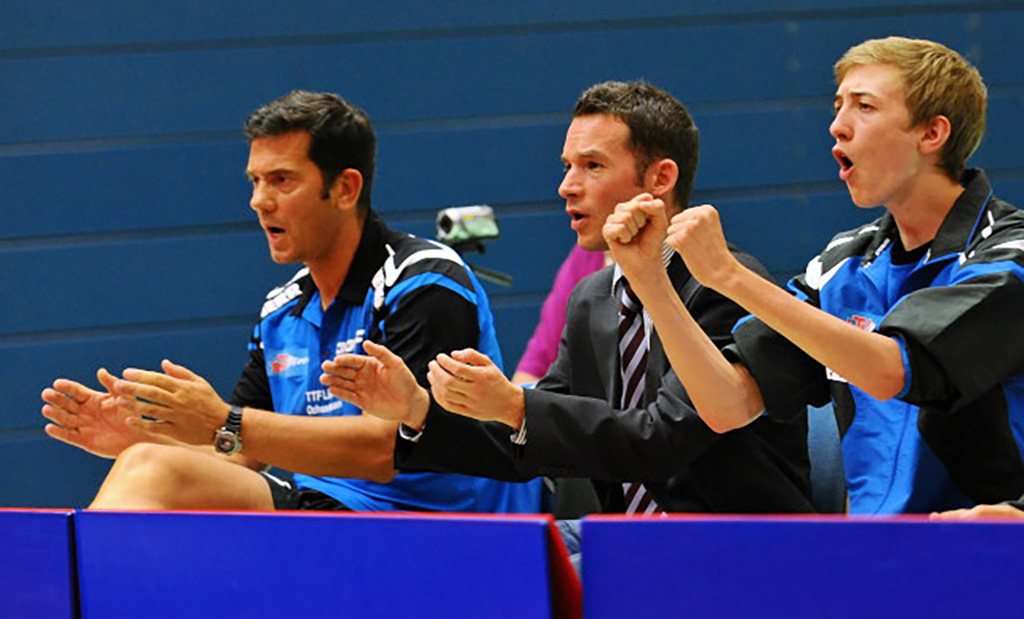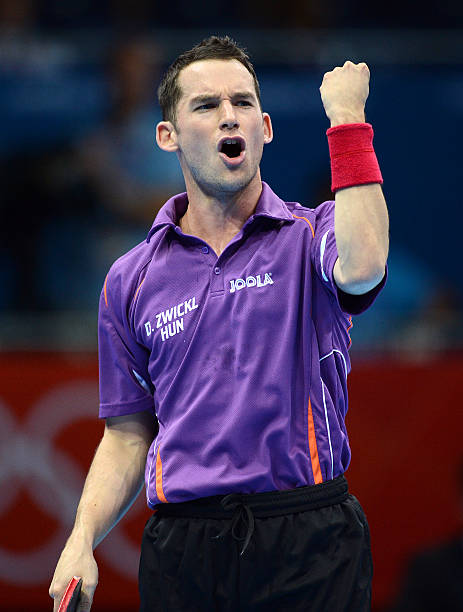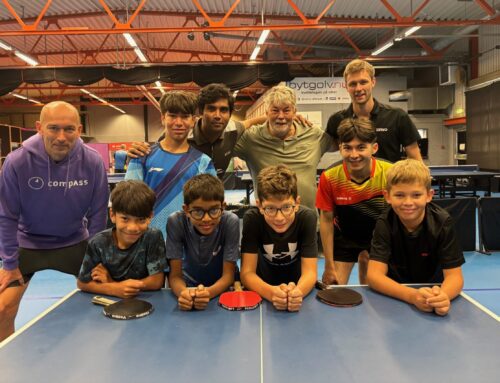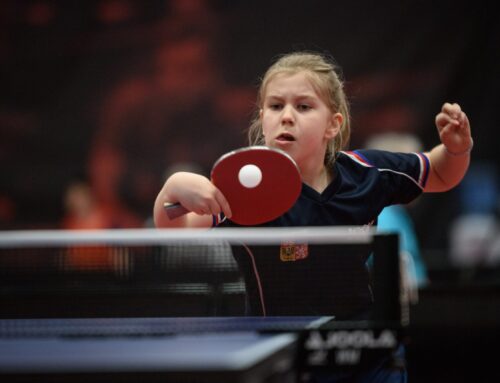Daniel Zwickl: Taking talent development to the next level
Interview with Dániel Zwickl, new Managing Director of compass who is not only a former table tennis Olympian but also the catalyst in reforming talent development at the Foundation. Discover his journey of leading compass into an innovative future.

none
Dániel Zwickl, new Managing Director of compass. Photo: Private
When Dániel Zwickl was young, he participated in seven European Youth Championships and won five gold medals in the cadet category. Moving on from his athletic career, he was a crucial part of the team that built Liebherr Masters College, the centre in Ochsenhausen, a facility where table tennis players from around the world can train and grow. Among others, Hugo Calderano and Simon Gauzy also spent time there developing their talents to become top 10 players in the world.
With all his experience and knowledge, it is little wonder that Dániel was top of the wish list when compass started their search for a new Managing Director and since the 1st of November 2021, the 37-year-old Hungarian has been on a steady course of leading the foundation into the future.
“Except for three years working with the emerging sport, teqball, all my life has been table tennis– both as a player and as a sport and team manager in Ochsenhausen,” Dániel said in a virtual interview. “Table tennis is the sport where I find my passion and enthusiasm, the sport I feel most engaged by. Furthermore, talent development is very close to my heart, having experienced it myself as a player as well as having had the opportunity to guide several generations of players at Liebherr Masters College.”

none
Dániel, Dubravko Skoric and Liam Pitchford during Dániel’s time as sport and team manager in Ochsenhausen. Photo: TTF Liebherr Ochsenhausen
Creating momentum
Dániel’s strength lies in combining his knowledge as a player and as a sports manager at the highest level, with the valuable experiences he gained from his work in developing the new sport teqball, an opportunity that gave him a broader understanding of the different areas of sport business.
As the new compass Managing Director, he is responsible for twenty rising talents across Germany, Sweden and France, and their daily trainers, as well as the full-time employed compass expert coaches Evelyn Simon and Oliver Alke.
“The compass Foundation started five and half years ago and I took over a well-functioning system,” he continued, “so my task therefore is to drive it to the next level, to create a framework and a strategy that will take us to the next stage of the project and beyond!
The way I see it, it is about creating a flexible and sustainable system where talents can grow as fast as possible along a pathway to the highest elite level. We also have to open up the organisation to talents from other countries throughout Europe and make sure we help the local and personal coaches of the talents to strengthen the home environment, so it matches our high goals. Additionally, it is important to serve as a connection between all the stakeholders involved – players, trainers, parents, federations, sponsors, national teams, and clubs. Honestly, it is very exciting to do something that has never been done before.”
Elite achievement can lack creativity
In October of 2021, Daniel went to Tours in France to experience Europe Youth Top 10, a tournament he played five times as a cadet and junior himself, to gain insight into how the game has changed since his participation.
“Generally speaking, the skill level in youth competition, for both girls and boys, is higher now than three to five years ago. However, what I missed was seeing players like Truls Möregardh or Annett Kaufmann, a compass player, who have a unique, innovative style. In places like Asia, where technique is in primary focus, training clearly teaches young talents that the system comes first and the individual second. I believe that to challenge the established dominance of Asian athletes in table tennis, we need to have the opposite order- individual first, system second. Creativity over regulation.
That’s how we work in compass: we scout and select at an early age; we aim to provide tailor-made support in talents’ home environments, including a personal coach with overall responsibility for the athletes’ development; we have an expert team available with high competence in all necessary areas, including the material and technologies to use.”

none
Dániel participating at the London Olympics in 2012. photo: SAEED KHAN/AFP/GettyImages
The importance of courage in sticking to the plan
During his time as a player in Hungary, Dániel was regarded as a wonder kid. He was anticipated to be the next world champion, like Klampár, Jónyer or Gergely back in the 1970’s. Dániel went on to have a successful professional career, playing at the London 2012 Olympic Games and achieving a world ranking peak of 89. He was always an elite player but having had the time to reflect on his career, he shares what he may have done differently.
“I would have been braver, would have believed in myself more and challenged the system. To become really good, you need to have the courage to do things differently to others and to how convention dictates. For this, you need to have the right coaches, be in the right environment with people around you that share the same values so you can make the right decisions at the right time.
Knowing this about myself has helped me be more dedicated in the support I show our young talents, encouraging them to know that rather than focusing on the result of the next competition, they need to focus on their long term development and overall vision. I believe that as an athlete, you should not compromise but instead follow your plan.”
As the next step, compass will be opening up the application process for new talents to be part of the talent support programme. Information will follow soon on the compass website.
Daniel Zwickl: Taking talent development to the next level
Daniel Zwickl: Taking talent development to the next level
Interview with Dániel Zwickl, new Managing Director of compass who is not only a former table tennis Olympian but also the catalyst in reforming talent development at the Foundation. Discover his journey of leading compass into an innovative future.

none
Dániel Zwickl, new Managing Director of compass. Photo: Private
When Dániel Zwickl was young, he participated in seven European Youth Championships and won five gold medals in the cadet category. Moving on from his athletic career, he was a crucial part of the team that built Liebherr Masters College, the centre in Ochsenhausen, a facility where table tennis players from around the world can train and grow. Among others, Hugo Calderano and Simon Gauzy also spent time there developing their talents to become top 10 players in the world.
With all his experience and knowledge, it is little wonder that Dániel was top of the wish list when compass started their search for a new Managing Director and since the 1st of November 2021, the 37-year-old Hungarian has been on a steady course of leading the foundation into the future.
“Except for three years working with the emerging sport, teqball, all my life has been table tennis– both as a player and as a sport and team manager in Ochsenhausen,” Dániel said in a virtual interview. “Table tennis is the sport where I find my passion and enthusiasm, the sport I feel most engaged by. Furthermore, talent development is very close to my heart, having experienced it myself as a player as well as having had the opportunity to guide several generations of players at Liebherr Masters College.”

none
Dániel, Dubravko Skoric and Liam Pitchford during Dániel’s time as sport and team manager in Ochsenhausen. Photo: TTF Liebherr Ochsenhausen
Creating momentum
Dániel’s strength lies in combining his knowledge as a player and as a sports manager at the highest level, with the valuable experiences he gained from his work in developing the new sport teqball, an opportunity that gave him a broader understanding of the different areas of sport business.
As the new compass Managing Director, he is responsible for twenty rising talents across Germany, Sweden and France, and their daily trainers, as well as the full-time employed compass expert coaches Evelyn Simon and Oliver Alke.
“The compass Foundation started five and half years ago and I took over a well-functioning system,” he continued, “so my task therefore is to drive it to the next level, to create a framework and a strategy that will take us to the next stage of the project and beyond!
The way I see it, it is about creating a flexible and sustainable system where talents can grow as fast as possible along a pathway to the highest elite level. We also have to open up the organisation to talents from other countries throughout Europe and make sure we help the local and personal coaches of the talents to strengthen the home environment, so it matches our high goals. Additionally, it is important to serve as a connection between all the stakeholders involved – players, trainers, parents, federations, sponsors, national teams, and clubs. Honestly, it is very exciting to do something that has never been done before.”
Elite achievement can lack creativity
In October of 2021, Daniel went to Tours in France to experience Europe Youth Top 10, a tournament he played five times as a cadet and junior himself, to gain insight into how the game has changed since his participation.
“Generally speaking, the skill level in youth competition, for both girls and boys, is higher now than three to five years ago. However, what I missed was seeing players like Truls Möregardh or Annett Kaufmann, a compass player, who have a unique, innovative style. In places like Asia, where technique is in primary focus, training clearly teaches young talents that the system comes first and the individual second. I believe that to challenge the established dominance of Asian athletes in table tennis, we need to have the opposite order- individual first, system second. Creativity over regulation.
That’s how we work in compass: we scout and select at an early age; we aim to provide tailor-made support in talents’ home environments, including a personal coach with overall responsibility for the athletes’ development; we have an expert team available with high competence in all necessary areas, including the material and technologies to use.”

none
Dániel participating at the London Olympics in 2012. photo: SAEED KHAN/AFP/GettyImages
The importance of courage in sticking to the plan
During his time as a player in Hungary, Dániel was regarded as a wonder kid. He was anticipated to be the next world champion, like Klampár, Jónyer or Gergely back in the 1970’s. Dániel went on to have a successful professional career, playing at the London 2012 Olympic Games and achieving a world ranking peak of 89. He was always an elite player but having had the time to reflect on his career, he shares what he may have done differently.
“I would have been braver, would have believed in myself more and challenged the system. To become really good, you need to have the courage to do things differently to others and to how convention dictates. For this, you need to have the right coaches, be in the right environment with people around you that share the same values so you can make the right decisions at the right time.
Knowing this about myself has helped me be more dedicated in the support I show our young talents, encouraging them to know that rather than focusing on the result of the next competition, they need to focus on their long term development and overall vision. I believe that as an athlete, you should not compromise but instead follow your plan.”
As the next step, compass will be opening up the application process for new talents to be part of the talent support programme. Information will follow soon on the compass website.






